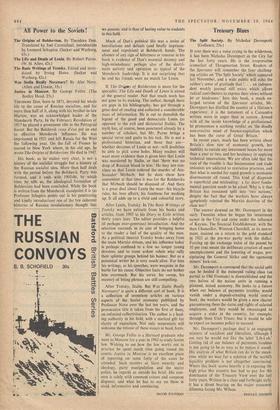Treasury Blues
The Split Society. By Nicholas Davenport. (Gollancz, 25s.) IF ever there was a voice crying in the wilderness, it has been Nicholas Davenport in the City for the last forty years. He is the irrepressible iconoclast of Throgmorton Street. Readers of the Spectator will .remember the four challeng- ing articles on 'The Split Society' which appeared last November, and a wide public will echo the author's sense of gratitude that . . an indepen- dent weekly journal still exists which allows radical contributors to express their views without let or hindrance.' Into this book, a much en- larged version of the Spectator articles, Mr. Davenport has distilled the essence of a lifetime's experience; it is the testament of a Cassandra written more in anger than in sorrow. Armed with all the inside knowledge of a professional, he pronounces a scathing verdict on 'the deadly non-creative mind of finance-capitalism which has been the curse of Great Britain.'
In recent years, much has been written about Britain's slow rate of economic growth, her inability to sustain any investment boom for more than a year or two, and her hesitancy in applying technical innovations. We are often told that the root of the trouble is that businessmen and trade unionists are addicted to restrictive practices, and that what is needed for rapid growth is economic disarmament all round. This kind of diagnosis is superficial and misleading: a far more funda- mental question needs to be asked. why is it that Britain has remained split into 'two nations,' despite the fact that the workers have always cpmpletely rejected the Marxist doctrine of the class war?
The answer dawned on Mr. Davenport in the early Twenties when he began his investment career in the City and came under the influence of Keynes. The financial Establishment, with the then Chancellor, Winston Churchill, as its instru- ment, insisted on a return to the gold standard in 1925 at the pre-war parity with the dollar. Forcing up the exchange value of the pound by 10 per cent meant the deliberate creation of more unemployment and the lowering of wages, pre- cipitating the General Strike and the agonising miners' lock-out.
Mr. Davenport is convinced that the social split can be healed if the moneyed ruling class (so partial to Old Etonians) is disestablished and the two halves of the nation unite in running a planned, mixed economy. He looks to a future when our balance of payments troubles would vanish under a deposit-creating world central bank; the workers would be given a new charter guaranteeing them the status and rights of salaried employees, and they would be encouraged to acquire a stake in the country, for example, through State Unit Trusts; but it would be idle to expect an incomes policy to succeed.
Mr. Davenport's package deal is an engaging mixture of socialism and liberalism, although I am sure he would not like the label `Lib-Lab.' Getting rid of our balance of payments troubles is not going to be as easy as he makes it sound. His analysis of what Britain can do in the mean- time while we wait for a solution of the world's liquidity problem is not altogether convincing. Where this book scores heavily is in exposing the high price this country has had to pay for the dominance of the Treasury View over the last forty years. Written in a clear and forthright style, it has a direct bearing on the major economic dilemma facing Mr. Wilson.
BRINLEY THOMAS


































 Previous page
Previous page